#mechanic gift
Photo

I'm Here Because You Broke Something Funny Mechanic T-Shirt
Get yours now: https://www.teepublic.com/t-shirt/39324611-im-here-because-you-broke-something-funny-mechanic
#I'm Here Because You Broke Something#Im Here Because You Broke Something#mechanic#mechanical#car mechanic#mechanic shirt#mechanic tshirt#mechanic gift#electrician#electricians#electrician shirt#electrician gift#electrical#electricity#wrenches#screwdriver#electrician tools#tools#fathers day#fathers day gift#fathers day gift ideas#fathers day 2023 gift
5 notes
·
View notes
Text
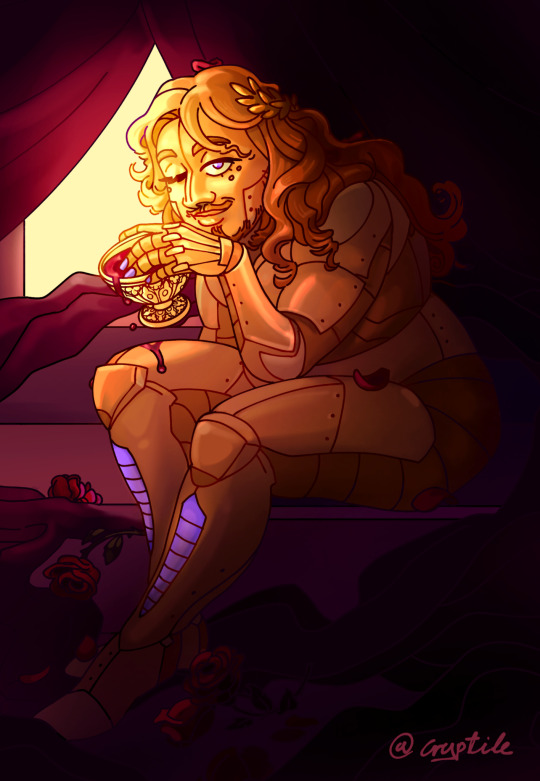
Yea you could say i like Brian
@reegis i did it, i did the thing, here he is. Consider this fanart for YOU
#the mechanisms#drumbot brian#the mechs#ulysses dies at dawn#udad#reegis thank you for this gift to the mechs fandom this is how i repay you#my art
523 notes
·
View notes
Text
Updated April 7th 2024 ☀️
It’s not finished yet, but there’s so much more to come!

#sfw agere#coping mechanism#age regression#age dreaming#sfw cgre#age regressor#no paci#RobloxGame#Holiday gift#happy holidays#:D#No emoji#Emojis on the way!
184 notes
·
View notes
Text
anyways mutuals this is your call to go watch pokemon horizons its the series currently airing and for once you don't actually need to know anything about what's happened before. its a new series with new characters to follow in a brand new narrative style. and it slaps. and if genuinely incredible characters, beautiful animation, and riveting battles aren't enough to convince you- shinonome ena's va voices liko, one of the protagonists.
just. go watch the first two episodes at least. for me. ok thank you
#ALSO CHINOZO WROTE THE FIRST OP AND ITS SO GOOD#AND WE HAVE LIKE. THE POKEMON PROFESSOR OF ALL TIME IM OBSESSED WITH HIM#his name is friede and hes like the epitome of gifted kid postburnout#and hes a loser. and hes so epic#and we have molly the punk nurse#and murdock the uncle ever#and dot aka the funniest character ever. too scared to leave her room. most popular internet streamer ever#nobody ever talks about landau hes a wise old man who spews genuine nonsense. ive never seen a man more perfectly embody quagsire/drampa#who am i forgetting. OH WE HAVE THE BEAUTIFUL ORIO shes a mechanic and also really cool. i like her
107 notes
·
View notes
Text
I don’t care what the plot of the community movie is as long as it starts with a shot of Troy and Abed cuddled together in bed and sleepily singing “Troy and Abed in the morning” as they wake up
#community#Trobed#Troy Barnes#abed nadir#community movie#no this won’t happen but I enjoy being delusional#I woke up this New Year’s Day with this image in my brain so I had to inflict it upon the rest of u#it’s a giant bed btw cause they live in a mansion cause Troy successfully completed pierces challenge and won his inheritance#and abed is a successful filmmaker#and they live in LA now#Troy does ac repair or car repair for fun#he doesn’t need to but he needs to do something with his time#and he mainly focuses on apprenticeships#and teaching those skills to high schoolers who can’t afford to go to college#can u tell I’m very attached to the mechanic Troy idea#he has a GIFT and it bothers me that it was completely set aside#he doesn’t necessarily need to use it but I like the idea of him starting his own school#except this time it’s not a cult#and it’s to show people that u can have a successful career WITHOUT college#the trades are valuable.#ok I’m done#actually no I’m not#he comes home every day and gushes about his students#‘abed you won’t BELIEVE how quickly Tony can diagnose and replace x!’#can u tell I know very little about cars#and then abed makes a film about Troy and his kids and they get a SHIT TON of money and all of it goes to scholarships and expanding#the school#yes Troy has money already but also running a repair shop and training kids for free is Expensive#and they both live happily ever after.#NOW I’m done
495 notes
·
View notes
Note
Celebi: "What is holiday what is it for"
Also Celebi: "I can make people smooch this is the best one"
(Referring to these tags on this post:)

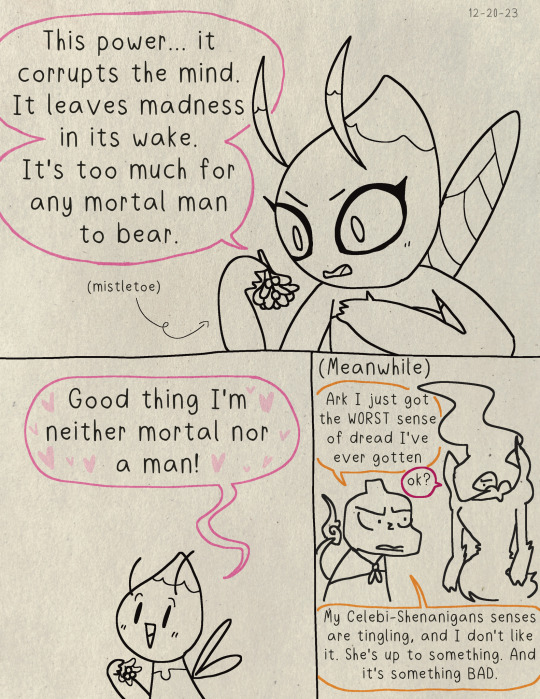
#hey Ark you said you wouldn’t let a plant tell you who to kiss#but what about if it was TWO plants#Twig has a sixth sense for when Celebi is Plotting Things#it’s a survival mechanism at this point#the present is a gift au#stuff by sofie#sofie answers asks#pmd2#pmd eos#pmd explorers#pmd sky#pmd#pokémon mystery dungeon#pmd celebi#pmd darkrai#pokemon mystery dungeon#pmd au#pmd comic
71 notes
·
View notes
Text
New, gorgeous comm by detail-oriented @kana7o for Ch 44 - Streets of Gold 😍
This was gifted by faithful Streets reader @aigoos 🥲 I selected this adorable scene from a few of her recommendations.
MECHANIC ANAKIN 🔥 Why didn’t I do this sooner? Thank you both SO much 🥹💕

#obikin#fanart#streets of gold#chapter 44#i love this so much#domestic post clone war obikin#hobby time ❤️#musical obi wan#wrapped in starfighter red like a gift for his mate#mechanic anakin#🥵#this almost killed me#cait you are incredible
78 notes
·
View notes
Text

"[President] Coolidge chose to celebrate July 4 [1927] -- which also happened to be his fifty-fifth birthday -- by remaining in South Dakota, where he was having the time of his life. In recognition of all the publicity he was generating with his trip, the state of South Dakota presented him on his birthday with a cowboy outfit and horse. Named Kit, the horse was charitably described as 'spirited.' It was in fact all but untamed. The President, who was by no means a horseman was prudently kept well away from it. Instead his delighted attention was focused on his other main present -- a cowboy outfit consisting of a ten-gallon hat, bright red shirt, capacious blue neckerchief, chaps, boots, and spurs. Coolidge retired to put it all on and emerged clankingly, and a little clumsily, in the full regalia a few minutes later. He looked ridiculous, but very proud, and posed happily for photographers, who could not believe their luck. 'Here was one of the great comic scenes in American history,' wrote Robert Benchley in The New Yorker that week.
Coolidge loved that outfit and wore it for the rest of the summer whenever he could. According to lodge staff, he often changed into it in the evening after his more formal day's duties were done, and for a few hours ceased to be the most important man in America and instead was just a happy cowpoke."
-- Bill Bryson, on President Calvin Coolidge's genuine love for an utterly goofy cowboy outfit given to him as a birthday gift during a vacation in the Black Hills of South Dakota in July 1927, recounted in Bryson's book One Summer: America, 1927 (BOOK | KINDLE | AUDIO).

#Cowboy Coolidge#History#Presidents#Calvin Coolidge#President Coolidge#Presidential History#Presidential Vacations#Presidential Gifts#Presidential Personalities#Coolidge Administration#Cowboys#Black Hills#Bill Bryson#One Summer: America 1927#Books#Presidential Photographs#First Families#First Couples#Silent Cal#Calvin Coolidge Was a Weird Dude#He Had a Mechanical Horse in the White House#Seriously
53 notes
·
View notes
Photo
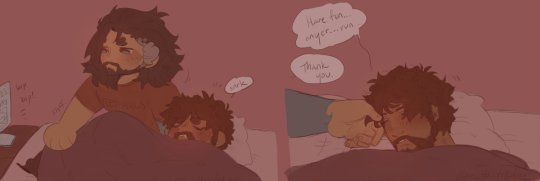
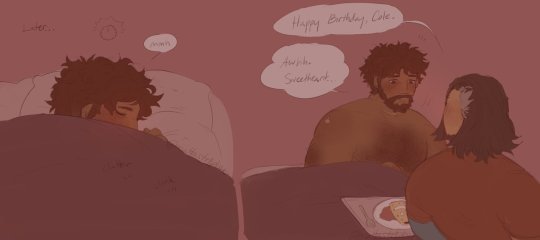
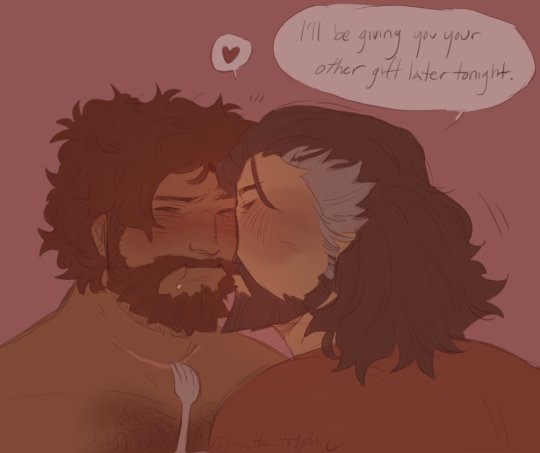
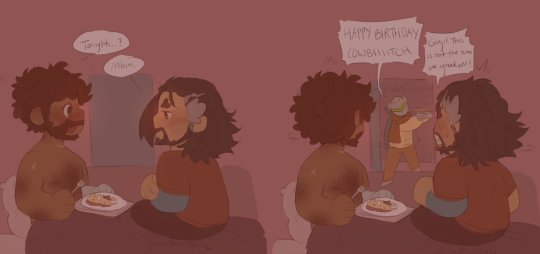
This was for Cassidy’s birthday on October 26, but I hadn’t come back here yet!
#yeehan#hanzo shimada#cole cassidy#overwatch#overwatch 2#genji shimada#mart#cowboy bday#hanzo's gift was a mechanical bull btw#he stole it from a bar#dont ask me how
442 notes
·
View notes
Text
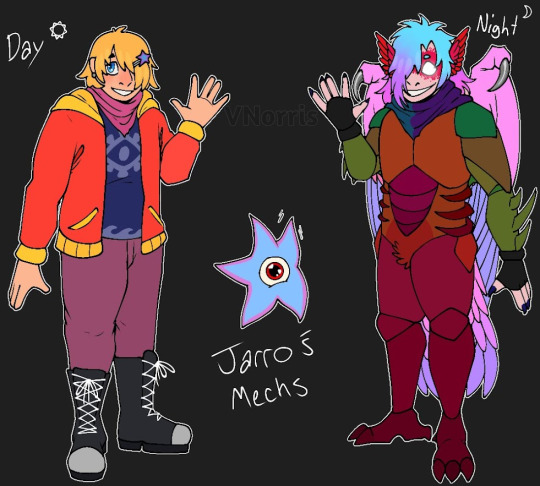
The little baby of the family got a pair of mech suits to use. He wanted to be able to go out with his family :>
#what's out there au#batman au#jarro#jarro the starro#mech suits#mechanical wings#wing au#I didn't draw it but Jarro has a lil cape shaped like wings even without his mech#His dad made it for him as a birthday gift#cryptid batman#cryptid batfam#dcu#dc
71 notes
·
View notes
Photo
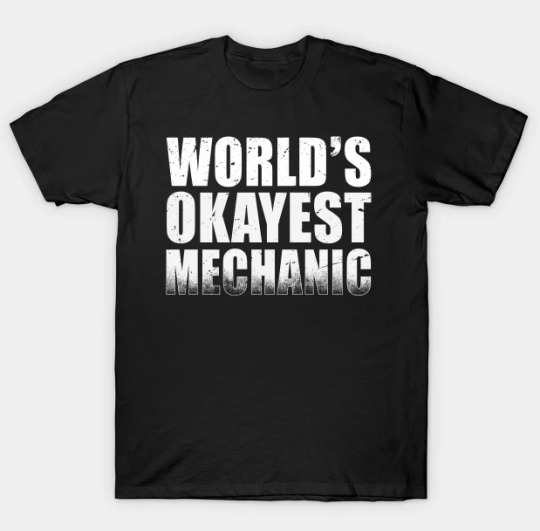
World's Okayest Mechanic T-Shirt
Get yours now: https://www.teepublic.com/t-shirt/39704236-worlds-okayest-mechanic
#World's Okayest Mechanic#Worlds Okayest Mechanic#worlds okayest#okayest#mechanic#mechanics#mechanic shirt#mechanic tshirt#mechanic gift#mechanic gift ideas#gift for mechanic#mechanic dad#mechanics girlfriend#mechanics wife#mechanic lover#love mechanic#mechanic quotes
0 notes
Text
I now have all the tools to make my own DVDs and I'm pacing around trying to figure out what to actually put on them because I want to make them !!!!! I want to learn them !!!! But I don't wanna waste the blank discs !!!!!! I don't actually have many files of things to put on them you know !!!!!
I will probably make a DVD of my favorite mechs liveshows.... WAUFFIDJD I'm fixating on adding a new Skill to my arsenal of Things I NEED TO MAKE MECHS DVD !!!!! I CAN'T WAIT!!!!
#by the way this was the same experience when i learned how to burn CDs by myself a couple years ago#my main things is everytime i learn how to make a New Thing i immediately want to gift it so someone#but. i don't think anyone i know wants a dvd or at least if they had something they wanted physical media of they-#ALREADY have it or i DON'T have it you know#sigh. putting this one off until later so I can actually slow down and enjoy a self indulgent project.#but it will bother me frantically unill then.#the mechanisms#physical media#my beloveds
32 notes
·
View notes
Text
Bonus 2
Here’s the second part of a holiday story, begun in part 1, about how Myka and Helena, in a vaguely season 4 world in which nobody’s going to go to Boone but through which they have thus far been separated, are reunited for a day-before-Christmas-eve retrieval in Cleveland. Helena has been summoned by Claudia to serve as Myka’s backup, for Pete is spending some holiday time with his family... but as it turns out, the retrieval is necessary because—plot-semi-twist!—Pete Christmas-gifted his cousin, who is a bigwig at an accounting firm, with an artifact, a pen that apparently has something to do with Santa’s naughty/nice list. Which said cousin used to confer end-of-year bonuses—and penalties. As this part opens, Myka is just beginning to process the fact that the whole situation is Pete’s fault...
(And no, I didn’t manage to bring this thing in for a landing in this part. Nobody faint from the surprise.)
Bonus 2
“Okay,” Myka acknowledges, because what else can she do? The fact is that in any Warehouse-related context, “coincidence” is a non sequitur, and she begins formulating a plan to Christmas-gift Claudia with a T-shirt featuring that sentiment. How fast can she get a custom T-shirt made?
The irony is that Claudia would know.
“Yeah,” says Pete’s cousin—Pete’s cousin! She might be affirming the Claudia-irony in Myka’s head, or the situational irony Myka is now stuck in, or any of the vast array of ironies that make up the Warehousian unfolding of time itself. Myka would not have expected Pete’s cousin’s words to contain multitudes. And yet.
“He told me it was the kind of thing he thought I’d like,” that cousin continues, “and he was right. Effects aside, it’s a gorgeous implement. Perfectly balanced... which I guess works on an existential level too, doesn’t it? Naughty, nice.” She shifts the pen to rest a delicate crosswise on an extended index finger, testing its equilibrium as a chef might a knife.
The pen—or is it merely a different species of knife?—basks in Nancy Sullivan’s regard. “Resonant little instrument,” she says, with clear affection. “Anyway, we were talking about Pete.” A different sort of affection now colors her voice. “He went into this big production-number apology about it being sort of secondhand.”
“Oh?” Myka says, distracted by pens, knives, resonances... but, right, secondhand. Of course it’s secondhand. No new item could be an artifact. Or could it? This seems like a Steve-conversation topic.... and it certainly beats “H.G. is god knows where” for philosophy.
“Not because it’s not new,” Pete’s cousin says, apparently reading Myka’s mind, “but because he initially was thinking he’d give it to somebody else.”
Myka repeats her interrogative “oh?”, but she’s getting a feeling again.
“Yeah,” says Nancy Sullivan, and Myka really has to applaud her talent for broadly applicable affirmation. “He said he wanted to give it to his partner because, and I quote, ‘she likes the old-fashioned stuff,’ but then he realized he shouldn’t because, and I also quote, ‘she’s got this whole family feathery-pen dealy-thingy and I don’t want to upset her.’” She waves the pen again, this time directly at Myka, like a conductor imploring the oboes to pick up the pace. “And he told me his partner’s name,” she concludes.
“I’m sure there are lots of Myka Berings in the world?” Myka tries, weakly, raising her hands as if to offer Nancy Sullivan all those other Myka Berings. The last vestige of defensibility... then her hands drop, because really. She looks at Helena in apology, with only an indistinct, tangled sense of what she’s apologizing for. I’m sorry I occasioned this is part of it, yet there’s a deeper fault she feels but can’t quite ideate, one more consequential than an anodyne “oops.”
“Listen, he’s a really good guy,” Nancy Sullivan says.
“I agree completely,” Myka assures her. But in the interest of full disclosure, she adds, “Mostly completely. I mean, I’m going to kill him for this.”
Helena says, “Are you.” Her tone brings Myka up short: it’s impossibly knowing, suggesting insight into everything Myka has been thinking, about someday and talking and things.
Again with the reading so right.
Myka would love to have the panache to do more than glance furtively at Helena, to pull off a playful, similarly knowing response, like “that depends on my backup” (or something actually clever that will doubtless occur to her during some post-holiday post-mortem). Instead she goes with a not at all interrogative “Oh.”
Nancy Sullivan looks from Myka to Helena. Then she says, “Okay, revision: A really good guy who might be hanging onto some unreasonable hope.”
Myka wishes she could keep from glancing yet again, now, at Helena—now as she grasps the fullness of her underlying error, now as she formulates a hopeful plan regarding someday saying out loud “I’m sorry I didn’t recognize that he had any such hope and that I didn’t make completely clear that any such hope would never have been anything but unreasonable”—but the wish doesn’t work. She glances... thus proving Nancy Sullivan’s point.
“He didn’t mention you,” Pete’s cousin tells Helena. “I think I see why.”
“I’m both offended and pleased,” Helena says, with her customary little thank-you head-bow.
Rather than luxuriating in the familiarity of that head-bow, Myka tries to head off a more detailed discussion of Helena’s role in it all (and what a nondescriptively limp phrase that is) by observing, “The sixth-sense thing is quite the family trait.”
“Ah. Sure. You’ve had experience,” Nancy Sullivan says, a little droop in her voice.
Has she taken Myka’s words as criticism? Myka hurries to reassure, “Sometimes it’s very helpful.”
“But. Other times.” This is heavier, and now she must be referencing her own vibe-related experiences.
“Your family get-togethers must be really... charged?” Myka tries.
Nancy Sullivan offers another all-encompassing “Yeah.” Then she laughs. “But at least we don’t have a feathery-pen dealy-thingy like your family does.”
Helena clears her throat, an attention-garnering ah-ha-hem, as if it’s in the stage directions preceding her next line in some farce. She inclines her head: more stage-direction drama. Finally, “You do now,” she says in benediction.
Nancy Sullivan’s jaw drops. “Wow,” she says, and “wow,” she repeats. Then she laughs again and says, “He really should’ve mentioned you.”
Myka might laugh too, but she is preoccupied by the way in which Helena’s well-chosen articulation has persuaded her body to remind her that it and she have reached no mutually satisfactory agreement about appropriate reactions.
And that in turn sparks Myka to a realization: once the retrieval is accomplished, there may be a nonzero chance that she and Helena could enjoy a bit more of that liminal together-presence...
Myka’s body makes its best effort to crash through the gauzy ideating her brain would prefer to do about what such time could entail, and after no small amount of nethers-vs.-cerebrum struggle, she manages to propose, truce-wise, a simple Let’s just hope it exists.
Surprisingly, body and mind are willing to shake on that, giving Myka leave to slip on a glove and pronounce, “Just give us the pen. Then it’s over. Mostly. The money will probably revert... so you’ll most likely have to redo the bonuses the old-fashioned way.” Hearing herself, she amends, “Well. The regular way.”
“I don’t mind redoing. But reverting...” Pete’s cousin tightens her fingers around the artifact, pulling it near to her body as if she might be considering, for one last “maybe,” the idea of punching her way out.
Myka tenses, and she doesn’t need to cast a glance to know that Helena is doing the same.
She glances anyway... and indeed, Helena alive with wiry readiness is a sight worth the seeing. So worth it, in fact, that Myka is genuinely, if improperly, disappointed that said sight doesn’t cause the truce to collapse.
After a moment, however, color returns to Nancy Sullivan’s knuckles, and Myka removes the pen from her slackened grip.
But then Nancy Sullivan cocks her head. “Is it really over though? I feel like something else might be happening.”
No. No. Absolutely not. “Something else is always happening,” Myka says, affecting nonchalance as she slides the feathery foolishness into a static bag, ignoring its yipping sparks of protest. “Don’t worry about it.”
Nancy Sullivan casts a skeptical look at the barky little bag. “If you say so. Anyway seeing Pete’s face when I tell him you and I –and he and I!—are fellows in family feathery-pen dealy-thingies now? Might end up being the second-best end-of-year bonus of all, given everything.” There’s a little mockery in her voice, echoing the cousin Myka knows so well.
“And the best such bonus?” Helena inquires.
“Docking Bob’s pay,” Nancy Sullivan says instantly.
Myka snorts, and Nancy Sullivan turns back to her and says, “Are you okay with me being glad we met?” Like she’s mostly but not entirely sure of the response she’ll get, and that’s another echo.
“Only if you’re okay with me being glad too,” Myka says, her own voice sounding a familiar note—one she’s pretty sure Pete would recognize.
After a nod, Nancy Sullivan turns to Helena. “I’d say it to you, but I feel like there’s something extra going on with you, like—”
Myka steps in: “Honestly, always,” and then she’s hustling Helena out of the office even as Helena chirps, “I’m both offended and pleased by that as well!”
Back in the elevator, Helena speaks first. “I did not expect that,” she says, sounding entertained by—practically bubbly about—the entire scenario.
“I should have,” Myka grumbles.
“You’re too hard on yourself.”
“Oh god no,” Myka says, involuntarily. “Too easy if anything.”
Helena’s eyebrows rise, and her eyes accuse. “I’ve known you for no small amount of time,” she says.
Myka’s previous review fights that statement, but she doesn’t speak of it.
Her lack of response prompts a heavy I-am-no-longer-entertained sigh. “Must I return to the phrase ‘your truth’?”
“Please don’t,” Myka says. That’s also nearly involuntary, but it sounds too harsh, like she’s dismissing as unimportant that bookstore interaction, as well as the entirety of those in-extremis manifestations of herself and Helena. Rather than apologizing for that, for surely it would prove far too entangling, she tries to draw Helena’s attention back to the entertainment. “I like Nancy Sullivan. She reminds me of Pete and his mom.”
“Pete’s mother? I don’t believe I’ve had the pleasure.”
That’s a bit more jousty, backed by curiosity. Good. “She’s a Regent,” Myka says, for it’s the most salient piece of information she has about Jane Lattimer.
Helena stills. Her jaw hardens. “Then perhaps I have indeed had the... pleasure.” Cold. Cold. Cold.
You idiot, Myka scourges herself. Why couldn’t she have done the normal thing and left Pete’s mom as “Pete’s mom”? But now, but now: now she’s seen this wound, down there under the ice, and she wants to test that ice, but she can’t, regardless of her wish and want to know know know, to know everything Helena has been put through, so as to know whom to hate (and she hopes that doesn’t include Pete’s mom) and whom to someday thank (and she double-hopes that does include Pete’s mom). “Anyway I think the cousin had the right idea,” she says, pushing back to the now, to what just happened. “Using an artifact to do what are really decent things, even if they were judgmental.”
“Rather Old Testament,” Helena says. “Strangely inappropriate for this holiday, no?” She asks that like she’s really thinking—wondering—about it.
Myka congratulates herself on having provided a distraction, however minimal, from whatever Regent-pain her unthinking reveal caused to surface. “I hadn’t thought about Santa being more Yahweh than Jesus,” she says, to enhance it, “and I’m not sure what it says about my position on salvation that I genuinely wish we could have let her keep that pen. Or even better, if we could maybe ferry it around to deserving arbiters... wouldn’t that contribute to the greater good, even if it’s in a judgy Old-Testament way?”
Helena’s face moves as if she’s about to answer, but before she can, a rupturing screech of metal-on-metal complication resounds decisively through the space, and their ear-popping descent slows, slows, slows...
...and stops.
After an appropriately irony-bearing pause, Helena says, “This elevator seems to disapprove of your suggestion. Or perhaps it’s your theological indecision that displeases?”
All Myka can manage is an extremely resigned “I am not surprised.”
Efforts to summon help strengthen the “disapproval” interpretation: they’re fruitless. No one answers the emergency line, and this mirrored box is, according to both their phones, the place where cell service goes to die. Or where that service is interfered with by a theologically offended pulley-based mechanism.
“I genuinely cannot believe we’re stuck in an elevator,” Myka says. It may be the most true statement to which she’s ever given voice.
After a beat, however, she concedes, “But of course I can.”
Helena casts her gaze around. Once again, exaggeratedly stage-direction-y. “At least it’s reasonably well-appointed. For an elevator in which to be... stuck.” She seems to relish articulating “stuck,” so she’s back to being entertained. Not quite bubbly, but definitely entertained.
Myka can’t get past her annoyance with the elevator’s disapproval, so she says a peevish, “I don’t like mirrors.” She’s painfully aware now that they cover not only the walls, but also the ceiling. She can’t even look heavenward in supplication, sarcastic or otherwise, without regarding herself. It really is too much.
Given that no other communication technology is working, she resorts to the Farnsworth. She gives thanks for Warehouse mojo, or whatever enables it to elude the elevator’s wrath, when Claudia answers with, “No info on ‘lists, making them’ yet.”
“We dealt with that,” Myka tells her. “New problem.”
“Another artifact?”
“Who knows? Maybe Pete’s in an elevator somewhere else in this town making bad decisions, and they’re redounding to our detriment.” She’s vamping. Stuck in an elevator with Helena, she’s vamping. Instead of simply basking in such fantasy-made-fact, she’s vamping.
She doesn’t bother wondering whether Helena knows she’s doing that; if this little adventure has done nothing else, it’s reminded Myka that Helena always knows. It’s both wonderful and terrible to be so legible, particularly to someone Myka so often finds frustratingly illegible.
“I’m not following,” Claudia says.
Speaking of illegible: Myka, heal thyself. “We’re stuck. In an elevator,” she clarifies.
Claudia makes a noise that, impressively, marries a gasp and a snicker. “Are you really? Or did you push the stop button, like people do?”
“Like people... what?”
“When they want to have a little uninterrupted chat,” Claudia says, pedantic, as if now she’s the one who’s “clarifying.”
“Nobody does that in real life,” Steve says from offscreen. Myka is pleased to know he’s around.
“Myka just did,” Claudia insists in his direction. “Didn’t you,” she insists at Myka.
“If I did,” Myka says, “why would I be calling you to get us out of here?”
“Yeah, why would she?” Steve asks, but from farther away.
Don’t leave! Myka wants to exhort. She would never admit to needing backup in a counter-Claudia sense... but she does appreciate when Steve provides it.
“Oooh, because maybe the chat didn’t go so well,” Claudia says with great, and to Myka’s thinking entirely inappropriate, relish.
Trying for calm pragmatism, she says, “Wouldn’t I just... unpush the stop button then?”
“Myka,” Claudia says. It’s the most chiding, disappointment-laden use of her name Myka has ever heard, even when measured against all the times her father has uttered those two designating syllables. “Believe me when I tell you I’m a fan,” Claudia goes on, turning mollifying, “but you really need to lean in when it comes to tropes.” Myka can’t imagine how to respond to that, so she doesn’t. Claudia sighs—seemingly everyone’s preferred go-to when Myka fails to produce words—and says, “Did you try calling maintenance? Pushing the emergency button? Using your cell?”
“Yes, yes, and no service. Do you genuinely think I don’t understand modern communication technology?”
“I think you pretend you don’t understand newfangledness all the time. Particularly when you’re trying to show off how sympatico you are with H.G., who incidentally doesn’t seem to be piping up like I’d expect. Did you knock her unconscious after your terrible chat? Or maybe during it?”
Helena has indeed been very—very surprisingly—quiet while Myka has explained the situation to Claudia. And she doesn’t step in to help Myka out now. So much for any counter-Claudia backup.
“There was not a chat,” Myka says.
Helena is regarding herself in the mirrored ceiling.
“But there could be one now?” Claudia nudges. “Let me see if I can see what’s up. I’ve got cell service.” She disconnects.
Helena abruptly abandons her ceiling self-contemplation, focusing her gaze upon Myka. It’s disconcerting. “Are you attempting to avoid an uninterrupted chat?” she asks.
Myka can’t suss the question’s sincerity. And notwithstanding all her ideas about talking, she suffers a cringing internal “yes.” Externally, however, she says, in what she hopes offers at least a veneer of sincerity of her own, “No.”
She doesn’t follow up by asking “why would I be doing that,” because Helena would probably have a guess. And because that guess would probably be accurate: “You are a coward,” Helena might say, and Myka would regrettably have to either tell the truth and agree, or lie and disclaim any emotional investment in whatever the outcome of such a chat might be.
Silence. Longer than it should be... or is it as long as Myka deserves?
You wanted time together. Don’t bellyache about the form it takes.
“Your objection to mirrors,” Helena eventually says.
“What about it?” Myka asks. Her very soul flinches.
“What is it?”
Myka has never before stated her dislike of mirrors aloud, and she regrets having done so now. To play it off, she says a dismissive, “An artifact.” And yet the truth is that despite the unnerving nature of her interaction with Alice’s mirror and how it continues to prey on her mind, it isn’t really that—or rather, that only intensified her dislike.
But when Helena proposes, “Yet another ‘dealy-thingy’?”, clearly (and preciously) trying the phrase out in her mouth, Myka misleadingly (intentionally misleadingly) nods and says, “They’re all dealy-thingies.”
To that, Helena says, “Interesting.”
Myka would probe that word, but to do so might destabilize the ground, here in an elevator. Instead, for the moment, she tilts her head in the direction of the Christmas muzak, the literal elevator music, being piped in. “Oh, sure, that still works.” She gestures at the speaker, a thin dark stripe between two mirror-panels, from which the sound is emerging. The elevator is nothing if not insistent.
In truth, she doesn’t mind Christmas carols. She does mind the bowdlerization thereof, and isn’t that an attitude the dogmatic elevator really ought to share? O holy night, the stars are brightly... synthesizing? It’s wrong.
Now even her mind is vamping. Great.
Helena tilts her head toward the speaker, however, and Myka appreciates her willingness to be redirected. At least for a moment.
In fact, for all her vamping, mental and otherwise, Myka finds herself absurdly content to simply stand against a mirrored elevator wall and regard Helena... who in that instant of Myka’s acknowledged contentment seems to accept their predicament as unlikely to be resolved in a timely fashion: she sits down, of course elegantly, resting her back against her side of the box and stretching her legs (her legs, Myka’s body notes, just to let her know it’s still paying close attention) out in front of her.
The looking-down perspective is a bit disorienting—although at least this time it has nothing to do with being stuck to a ceiling—but Myka has no time to process it, for Helena’s next salvo, looking up, is, “You’ve been expecting me to remark further on naughtiness, haven’t you.”
Reading, yet again. “I kind of have,” Myka admits. It seems an overly judgmental statement, particularly given that Myka has to deliver it as if from an elevated bench. And yet... she kind of has.
“I’d rather not fulfill that expectation,” Helena says. “If we could speak of other things.”
Myka is a little thrown, but thankful. “That is entirely fine by me. What do you want to talk about?”
“Honestly?”
“Honestly,” Myka says, meaning it as an answer to either interpretation of Helena’s interrogative: Are you asking what I want to talk honestly about? or Are you asking, with honest intent, what I want to talk about? She hopes Helena will respond similarly.
“Something that interests you,” Helena says.
That’s not in any way what she was expecting. “Really?”
“Really.”
It’s a word similar to, yet very different from, “honestly.” What, in a real sense, interests Myka? In this moment, all she can think to say is “you.” And perhaps because her normal inhibitions are disordered, here in this stopped elevator, that’s what she blurts out.
And that seems, incongruously, to take Helena aback. “What about me?” she asks.
Myka can’t say “everything.” It’s the real answer (really), but it’s far too... big. For an unexpected reunion, an unexpected uninterrupted chat—although Claudia or rescuers could at any point interrupt it, which Myka should hope happens (should)—it’s far too big.
So: smaller. What occurs first to Myka is “where have you been”—but that would most likely seem accusatory. She needs something else. Something something something...
In the aftermath of the Warehouse not being destroyed, she’d felt herself full of hard-earned wisdom and bravery: enough, surely, to stop hesitating. Enough, surely, to act. Or enough, at the very least, to articulate.
“Wisdom” and “bravery” now seem nothing more than labels on empty containers, and so “faintheartedness” is the fullness with which Myka here initially accuses her today self. But as Helena breathes and waits for an answer, Myka revises that, gentling it to “caution.” And she adds “care.” Because she is trying to attend to, to appreciate, that breathing. And that waiting.
These might be nothing more than self-indulgently comforting shifts in vocabulary... but then again they might be akin to the shift from “Christmas” to “end-of-year.” Gentle. Inclusionary.
The something something something that occurs to her—because in attempting to avoid her own reflection, she is confronted instead with multiple Helenas—concerns a topic she probably should censor but doesn’t: “When you were a hologram... or a projection, or whatever we should call it... did you have a reflection?” She then reflexively backtracks, “It shouldn’t matter? But I don’t know.” That last, she means both ways. She doesn’t know: whether the reflection existed, or whether it matters. But maybe it’s a sneak-up on things, because she shouldn’t ignore things, and because a seemingly inconsequential tangent might tiptoe toward importance.
“I don’t know either,” Helena says. “I suppose I would have?” Her face contracts. “Or perhaps not, as I don’t know how that holographic projection of myself was... projected. But I do intend to look into it.” She says this last as if Myka has caught her in some inattention, a recklessly uncompleted assignment.
“I never even started majoring in physics,” Myka laments, which is true but also, she hopes, reassuring in an I didn’t do the homework either sense, “so I don’t know the optics of it. Projections. Light and mirrors. “ She doesn’t mention that in the wake of Pittsburgh, she had indeed tried researching such things... she’d got as far as some advanced volumetric displays, ones using dust particles as screens onto which lasers projected light, but at a certain point, a tipping point, the idea of Helena existing as—being relegated to—nothing more than light and dust screamed a surpassing insult, a degradation conjuring death, and it was more than she could bear.
For now she puts that away. She shakes her head, shakes it free, and changes tack. “Anyway, that’s probably the wrong approach. This is Warehousey, so thinking outside physics, the laws... okay, all I know about reflections, unphysically, is that vampires don’t have them. So if you didn’t have one, then maybe all holograms are vampires?” Ugh. Ugh ugh ugh. She would have done better to speak of dust, that and light and despair. Going with vampires instead? Talk about vamping...
“Presumably not vice versa,” Helena observes, seemingly taking Myka’s words far too seriously. “Certainly fictionally. Also not overly flattering, in the syllogistic sense of ‘Helena was a hologram, therefore.’”
“They’re very popular though,” Myka temporizes.
“Stoker’s novel was all the rage,” Helena allows.
The chat stalls out. Interrupting itself?
Myka nevertheless feels pressure to fill the silence: it’s her fault. Will a simple truth suffice? “I didn’t expect to be spending the day before Christmas eve with you,” she says. “Or any day with you. In Cleveland.”
A small smile from Helena marks this as a more welcome fill than a question about reflection. As do her next words: “Nor I with you. In Cleveland, or any place. Equally, I didn’t expect to be sent on a mission with you.”
“That part of it went well.” Myka gestures at her bag that contains the artifact.
“We did—and now do once again—make a good team.”
“I’m glad we got the chance to do it again. Glad, but also... relieved.”
“Relieved,” Helena echoes.
That wasn’t a question, but Myka answers anyway, “Well, obviously, first,” she says, feeling herself launching into an explanatory babble that she fears she’ll be powerless to stop, “because you didn’t have to talk anybody out of using Joshua’s Trumpet, so that really makes a difference in terms of how we—”
“‘First’,” Helena quotes, interrupting (stopping), conveying her full knowledge that that too is a vamp. “And second?”
“That we still are.” This, Myka says simple and frank.
“A good team?”
That is a question. Myka knows “yes” is the only sensical answer, so she tries to say it. But the depth and weight of the ways in which she and Helena “still are” choke her: they “still are” in the basic sense of existing, which was never a certainty; and even better, higher, these hours they’ve spent together today have made clear, to Myka at least, that they “still are”... well. She’d like to finish that with something like “in love,” but instead she tries to leave it, even in her head, at “still are,” with their time-crossed, maybe-destined predicate undefined.
“A good team” should be good enough—true enough—for now.
So after a stretch of time during which Myka knows she’s been focusing her gaze far too intently on Helena, she manages that “yes.”
Helena waits to speak.... are her eyes glistening more brightly than usual, or is Myka hallucinating? “I’m relieved as well,” she says, and Myka chooses to simply delight in whatever prompted such a saturated sparkle.
It draws her closer.
She crosses the small-yet-large elevator-width that separates them. “I need to either sit down beside you or help you up,” she says. “Do you have a preference?”
“For?” Helena’s eyes continue to glow.
That shine... Myka has hopes. They may not be realized, but she has them, the product of relief, “still are,” and an unknown predicate. “Whatever’s next,” she says.
A bit of time passes, with Helena now being the one focused most intently. “I’ll stand,” is her verdict.
Myka reaches down with both—both—hands, offering, and Helena reaches up, accepting. Their fingers meet and clasp, and too cold, Myka thinks, for both of them have a chill in those extremities... but first impressions of temperature promptly fall away as the new reality of the clasp roars into precedence.
Myka has never been so certain of, so certain of and enchanted by, what must and will happen next in her life. Never in her life so certain, as the clasp tightens, as their torsos lean, as Myka’s body begins an at-last congratulation, one that will become a celebration—
A voice from somewhere overhead barks, “Everybody okay in there?”
TBC
#bering and wells#Warehouse 13#fanfic#holiday (but not Gift Exchange)#Bonus#part 2#you never can tell what mechanisms might be up to#sneaky ghosts in machines#(sneaky ghosts ARE machines)#anyway like I said in part 1#I wanted to put a couple of people in a clichéd situation#and the way this part ends was probably obvious from the get-go#but really#was that space the right venue for...#anything?#Claudia's encouragement aside
31 notes
·
View notes
Text
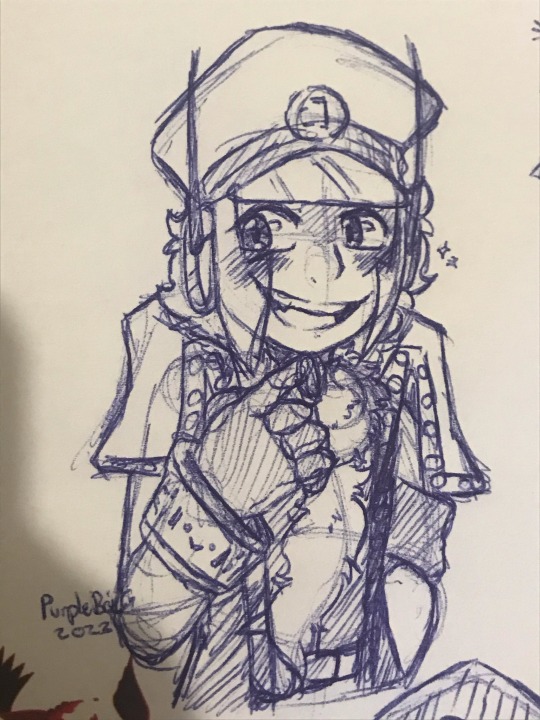
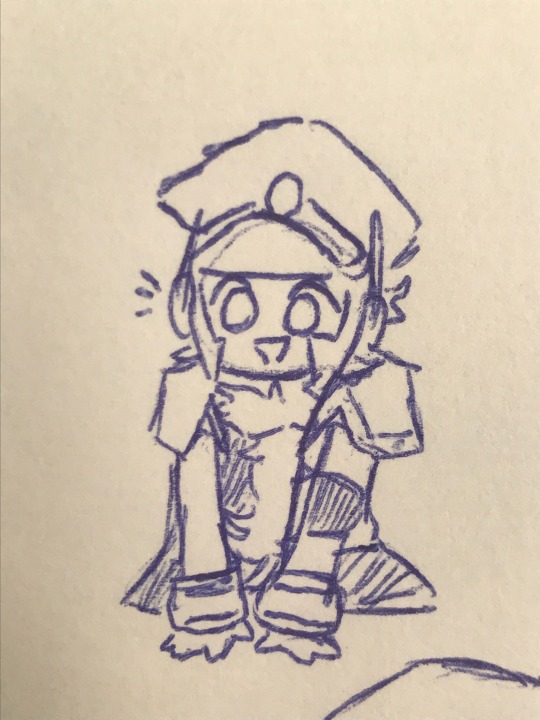
Drew a little bit of fanart of @marchy-emmet ‘s Robot Emmet! He was incredibly fun to draw :]
83 notes
·
View notes
Text
is “please im just a twenty-something year old teenage girl” a valid excuse to my quantum physics professor for my late homework
#please im so tired#i understand in class but WHAT is going on#quantum mechanics#quantum physics#physics#physics student#physics studyblr#ex gifted kid#all my self worth is relying on my grades#burnt out gifted kid#gifted kid burnout#i need validation#i thrive on validation#chaotic academia#academic validation
36 notes
·
View notes
Text

anon godbless
#my dumb ass will laugh every time#no one cares about what i spend Tip money on but i bought a mechanical keyboard#i used an amazon basics keyboard for like 5 years i could snap it in half if i wanted it was so thin and cheap#now im in asmr clicky hell with a wireless tank of a keyboard that lights up like christmas#i love it i wanna get into switching out the keycaps and all that neat customizing shit folks do#ALSO GOT GIFTED CRABS everyone is spoiling me everyone is trying to make me cry (successful)
128 notes
·
View notes